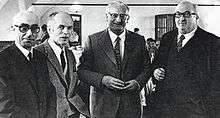Giuseppe Luraghi
Giuiseppe Luraghi (12 June 1905 – 11 December 1991) was an Italian lyricist and engineer, working for Alfa Romeo where he also was president.[1]

Luraghi studied economics and trade at Bocconi University He worked 1930–50 for the milanese Pirelli tyre manufacturer (established 1875). Before the outbreak of the Spanish Civil War in 1936 he also led the Barcelona office of Pirelli. In 1950 he was hired by Enrico Marchesano (1894–1967), president of the Institute for Industrial Reconstruction (IRI), to become the director of a hydroelectric powerplant in Piedmont. In 1951 he became director of Finmeccanica, the technical branch of IRI, a position he held til 1956.
He continued as vice president of Alfa Romeo, while also being the director of the Lanerossi company 1956–60.[2] From 1960 to 1973 he works for the federal Finmeccanica, in particular as the executive director (CEO) of the Alfa Romeo car manufacturer of Milano. Luraghi was also a poet and a novelist. He started writing in the 1940s. From 1977 to 1983 he was nominated president of Arnoldo Mondadori Editore, a milanese publishing house that had published his literary works in the 1960s.
Publications
- Presentimento di poesia (1940)
- Gli angeli (1941)
- Cipresso di van Gogh (Garotto, Officine Grafiche "Esperia", 1944)
- Stagioni (1947)
- Due milanesi alle piramidi (1966)
- Come saggista vengono pubblicati: Le macchine della libertà (1967),
- Milano, dal quattrino al milione (1968)
- Capi si diventa (1974)
- Pepp Girella ai fanghi (Mondadori, 1974)
- Miracola a Porta Ticinese (Mondadori, 1976)
- Oh bej, oh bej (All'Insegna del Pesce d'Oro, 1987)
Literature
- Una sfida al capitalismo italiano: Giuseppe Luraghi
References
- Annalisa Gimmi, GIUSEPPE LURAGHI L'industria culturale in Il Giornale, December 19, 2005.
- Nicola Crepax, LURAGHI, Giuseppe Eugenio from treccani.it, Biographical Dictionary of Italians - Volume 66 (2006).